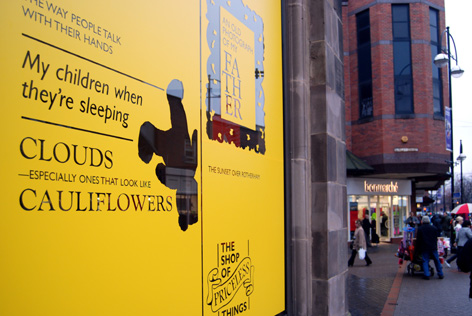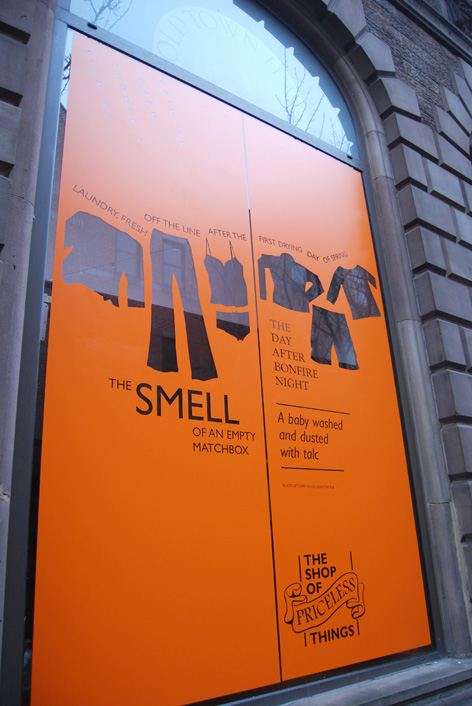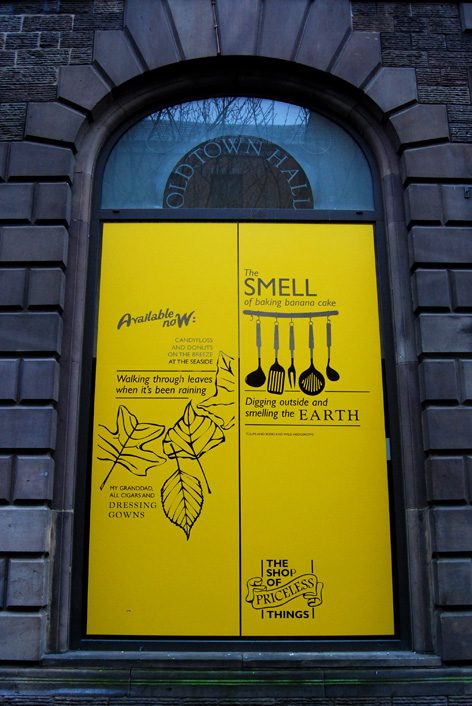A Place For Words: The Shop of Priceless Things
What happened?
In 2009, design studio, Electric Angel, responded to Rotherham District Council's call for ideas to revitalise the empty Burger King building in the centre of the town.
Adrian Riley of Electric Angel and the poet, John Wedgwood Clark, wanted to reflect on the Christmas period's focus on shopping by thinking about what money could not buy. They spent a day talking to people in Rotherham about their priceless things: asking them to share the sights and sounds they valued, evocative smells that triggered memories, things that are special to touch. These ideas became the 'stock' of The Shop of Priceless Things and were installed (in December 2009) as beautifully designed text vinyls in the shop windows (eleven of these are still in place in 2011). John wrote a poem, which explained the concept of the shop; all the other texts are direct quotes from respondents.
Adrian and John's initial instinct was to design the window vinyls to mimick existing logos and 'sale!' notices, creating a visual joke where viewers would only realise it wasn't a real shop once they stopped to read. Subsequently they decided that the thoughts and ideas shared by shoppers ought to be treated with more respect, and arrived at something partway between a high-end furnishings store and graphic artwork. The work has strong visual impact and yet a simplicity and purity rarely seen on the UK high street.
The project was well received locally, with one viewer commenting: Thank you for reminding us to look for the profound amid the daily turn of life.
Project Gallery

Clouds especially ones that look like cauliflowers
Photo: James Rush

The day after bonfire night
Photo: James Rush

Digging outside and smelling the Earth
Photo: James Rush
What made it work?
- Involving local people in creating the 'stock' of ideas for the shop. "It wouldn't have had the same impact, nor been an authentic artwork for Rotherham if it had been the things that John and I valued," says Adrian Riley.
- Creating high-quality designs that treated participants' ideas with respect. A simple idea realized using straight-forward language; additional nuances were brought out through playful imagery, rather than messing with the words.
- Creative dialogue and ongoing conversation between the project artists and the participants.
- Assessing the wider impact of the project, Adrian Riley comments: "There's a bit of tension between putting something positive and, we hope, beautiful into the middle of town and the property remaining empty. Whilst I'd rather see empty shops put to creative use than just stand there unwanted and unloved, temporary projects like 'The Shop of Priceless Things' ultimately draws attention to a society and economy where the town centre needs to rediscover a role beyond just being a collection of shops. Town centres have to become environments where people can also play, dream, be culturally enriched and just enjoy being a community."
Further information and links:
« Back to Case Studies, Literature and public art (temporary outcomes)


